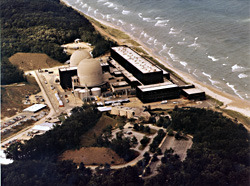
On November 21, 1997, the NRC began investigating an allegation it had received that control room operators at the Donald C. Cook nuclear plant in Bridgman, Michigan, were not paying proper attention to their duties. The NRC investigators found that the operators made 123 telephone calls from the control room to a sports and information hotline in the last four months of 1997.
Despite the volume of calls, the investigation concluded that “no operator errors were identified to occur concurrent with periods of telephone calls.” Although the report was not explicit, it is assumed it meant no mistakes operating nuclear plant equipment were made rather than that the operators did not make any dialing errors.
Last year, the NRC learned that control room operators at the River Bend nuclear plant in St. Francisville, LA were not paying proper attention to their duties. The NRC found that the operators were using computers in the control room to access to access news, sports, finance, and fishing sites on the internet. Most of the operators knew that cruising the internet while at the controls of a nuclear power plant was prohibited, but did it anyway.
If you have internet access and are not currently at the controls of a nuclear power plant, you can click on this link to see that the NRC proposed a $140,000 fine against River Bend’s owner and sanctions against nine operators determined to have deliberately violated bans against cruising the web while on duty in the control room.
Our Takeaway
Control room operators are not allowed to surf the web while on duty. Nor are they allowed to sleep on duty (Fission Stories #9). Nor are they allowed to listen to music in the control room (Fission Stories #30). And staging the “When You’re A Jet” dance sequence from West Side Story is almost certainly forbidden, too.
Control room operators are licensed by the NRC – no other nuclear plant workers must be individually qualified by the NRC – and paid lucrative salaries by plant owners for a real good reason – their actions, and inactions, can mean the difference between near-miss and nightmare. It is tempting to find something to do to pass the time at four in the morning on a graveyard shift. The operators usually resist the temptation. Their own ethics along with the efforts of plant owners must ensure they maintain the proper focus on safety while on duty.
“Fission Stories” is a weekly feature by Dave Lochbaum. For more information on nuclear power safety, see the nuclear safety section of UCS’s website and our interactive map, the Nuclear Power Information Tracker.
